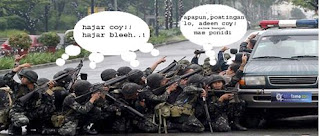
Indonesia announced on Monday plans to spend rapidly $3.56bn saved from the 2008 budget on infrastructure projects and tax breaks to stimulate the economy and mitigate the impacts of the global economic crisis.
Sri Mulyani Indrawati, the finance minister, said much more money could be available if conditions warranted it. She said this could come from either a $5.5bn (?4bn, £3.8bn) standby budget facility co-ordinated by the World Bank or new bonds. She claimed international demand for Indonesian debt was mounting because yields were many times higher than anything available in the west.Analysts say Indonesia's macroeconomic fundamentals are more robust than most countries in the region and much healthier than was predicted only two months ago. This is thanks largely to exports accounting for only about 14 per cent of economic growth, which was about 6.1 per cent last year and is forecast to be between 4 per cent and 5 per cent this year.But they warn against complacency, citing the uncertainty of the global economy, the country's militant labour movement that could cause unrest if mass layoffs become necessary, and the unpredictability of legislative and presidential elections in April and July respectively.Mrs Sri Mulyani said the government would ask parliament to carry over Rp51,300bn ($4.8bn, ?3.4bn, £3.2bn) of surplus funds from last year's budget but that a quarter of it would be allocated to routine expenditure in January and contingencies.
The funds, generated mostly from better-than- expected tax revenue, represent 4.9 per cent of the government's planned 2009 spending.She did not specify how much of the stimulus would be allocated to infrastructure projects and how much to incentives to improve competitiveness and domestic demand."We've already received a lot of proposals and we're assessing them right now," the minister told a gathering of journalists and analysts that had an atmosphere of electioneering."What's important is that all the steps boost domestic demand, create jobs, help small and medium enterprises and reduce poverty and unemployment. "Indonesia's economy was lifted on Monday by the latest inflation data, which showed prices rose 11.06 per cent in December, year on year.
This is lower than most forecasts and well down from the 2008 peak of 12.14 per cent in September.Analysts predict Bank Indonesia will now be able to cut its benchmark interest rate from 9.25 per cent when it meets on Wednesday.
Comments